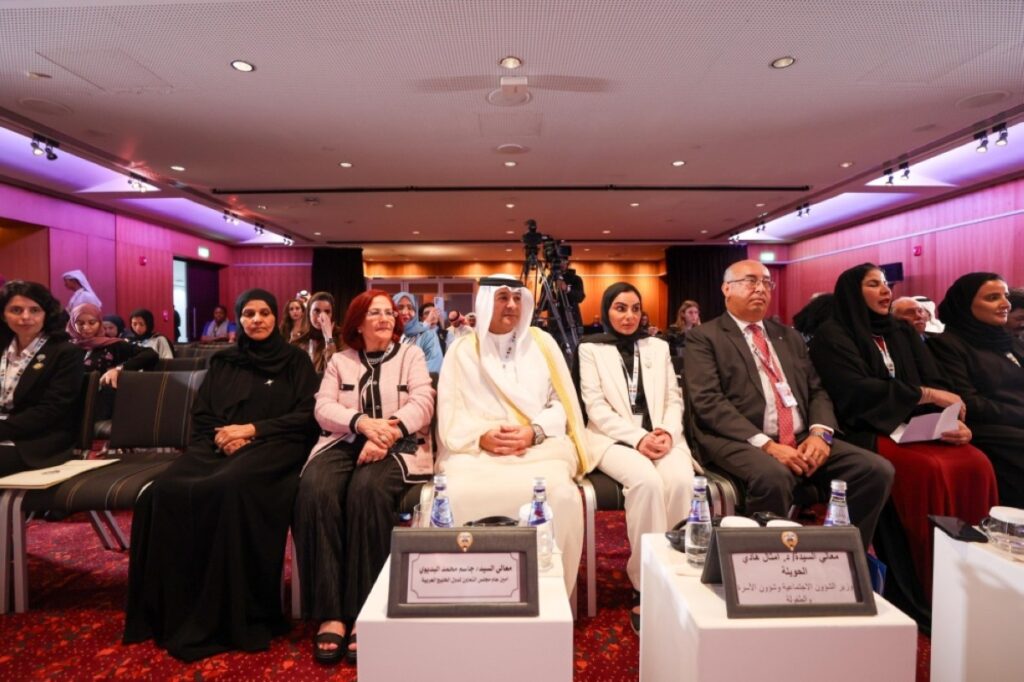DOHA: Minister of Social Affairs, Family and Childhood Affairs, Dr Amthal Al-Huwailah, emphasized on Tuesday that investing in women is not only a commitment to equality but also a strategic investment that drives sustainable solutions for societies. Her remarks came during the opening of the high-level side event, “SheBuilds: Women Creating Social Solutions for an Inclusive and Comprehensive Future,” organized by the Kuwaiti Ministry of Social Affairs as part of the Second World Summit for Social Development in Doha, in cooperation with the Gulf Cooperation Council (GCC) General Secretariat and the United Nations Office in Kuwait.
Minister Al-Huwailah noted that the event, attended by GCC Secretary-General Jasem Al-Budaiwi, UNESCO Regional Director Salah Khaled, and several heads of delegations and representatives of regional and international organizations, “celebrates women’s creativity in social development and their ability to innovate solutions that make a tangible difference in the lives of individuals and communities.” She added that today’s world is characterized by the intersection of economic, environmental, and social challenges, yet women across the region and globally are emerging as a driving force for positive transformation, building a more inclusive and equitable future.
She explained that women-led social innovation is inherently inclusive, reflecting a deep understanding of the needs of marginalized groups and a commitment to removing barriers that limit participation in development. “Women are not just innovating ideas, but redefining the meaning of development and justice from a humanistic perspective,” she stated, highlighting that the workshop would showcase real-life examples of Kuwaiti women addressing societal challenges through creative and practical solutions.
Minister of Social Affairs, Family and Childhood Affairs, Dr Amthal Al-Hawila
The minister described the interactive sessions as an intellectual and practical journey, “beginning with inspiration and concluding with actionable creativity,” designed to empower participants to apply innovative thinking to social challenges and translate ideas into tangible outcomes. She expressed hope that the event’s outcomes would strengthen regional and international cooperation, promote women’s participation in policymaking, and empower them economically through knowledge-based initiatives and networks of pioneering women in community work. Concluding her remarks, Minister Al-Huwailah said, “In a world of accelerating transformations, today’s women are not only demanding a place at the development table, but are also redesigning the table itself so that everyone can sit at it.”
GCC progress in women’s empowerment
GCC Secretary-General Jasem Al-Budaiwi praised the “qualitative leap” in women’s empowerment across the Gulf, noting their growing presence in the labor market as a driver of productivity and economic diversification. He highlighted that the UAE and Bahrain lead the region in women’s economic participation, with increasing representation in specialized and leadership roles, supported by gender balance policies and empowerment programs across public and private sectors.
Al-Budaiwi noted that women’s workforce participation in Saudi Arabia has risen to 35 percent, while Qatari women comprise 44 percent of the workforce. Oman and Kuwait continue efforts to enhance women’s participation through labor market reforms, skills development, and entrepreneurship initiatives, with women in Oman reaching 34.9 percent and in Kuwait approximately 48 percent of the public sector workforce. He emphasized that women’s empowerment is a fundamental pillar for achieving the United Nations Sustainable Development Goals, particularly SDG 5 on gender equality.
He added that the session aims to highlight the importance of positioning women as leaders and innovators in social and digital spheres, supporting women-led initiatives, facilitating knowledge exchange, and strengthening partnerships between governments, the private sector, and civil society.
Kuwait’s achievements
UNESCO Regional Director Salah Khaled underscored that Kuwait has embedded women’s empowerment within its 2035 vision, aligned with SDG 5 (gender equality), SDG 8 (decent work), and SDG 10 (reducing inequalities). He noted that women now constitute 60 percent of Kuwait’s public sector workforce and hold 28 percent of leadership positions across the country, reflecting the state’s commitment to inclusive development and equitable participation in decision-making. — KUNA



